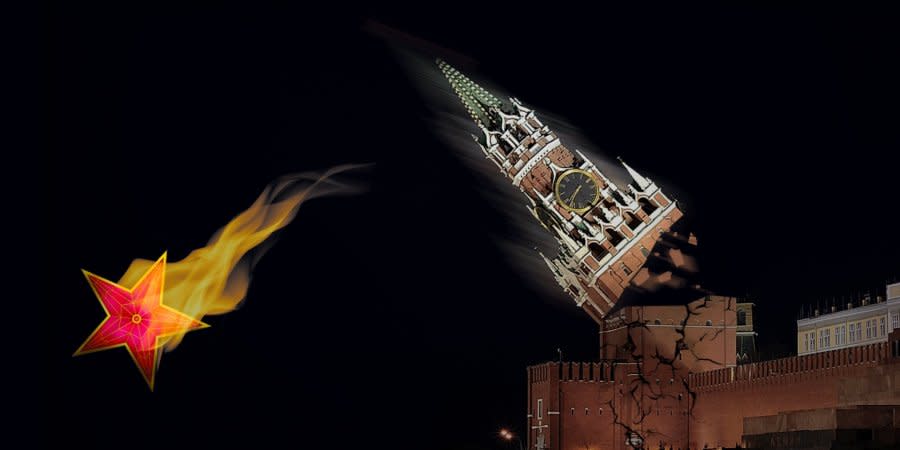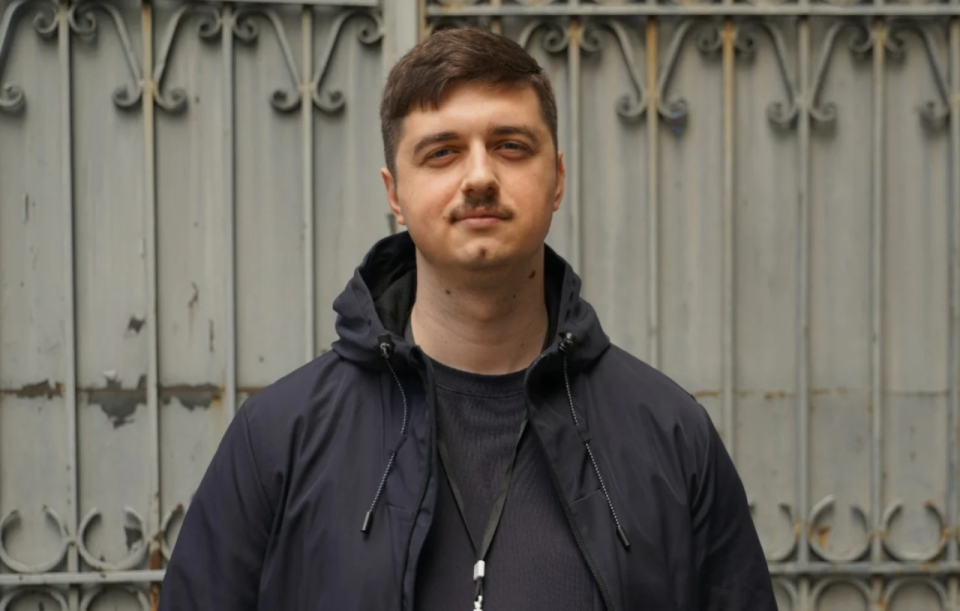How likely is Russia’s disintegration?

NV invited Anton Muraveinyk, chief analyst at the prominent Ukrainian NGO Come Back Alive, to have a conversation on this very topic.
NV: Tell us about your research into the possibility of Russia disintegrating?
Muraveinyk: First of all, a disclaimer: we can’t reveal every detail of our report – due to security considerations. The full report will be classified, with conclusions made available to major stakeholders: the Ukrainian government and some organizations and international partners.
We began the work on the Transformation of Russian Statehood project back in July-August 2021. Our experts felt Kyiv was not doing enough to resist Russia’s creeping aggression, so we decided to think about how the Russian state can be made benign, so that it was no longer a threat to Ukraine. Most scenarios still envisage Russia remaining our neighbor after the war. And most of them suggest that whatever entity replaces the current Russian regime would still remain an existential threat to Ukraine.
In terms of security, we must first point out that Russia is not a unitary, but a heterogeneous state. This means that to study Russia, one must examine its vast array of diverse regions and republics, with their specifics and particular ethnic compositions. Some of the Russian federal subjects have minorities outnumbering ethnic Russians, others – don’t.
Read also: World must be ready for Russia’s disintegration, US general says
Additionally, we paid special attention to cybersecurity and the IT industry, in general. Cyberwarfare is a crucial dimension for us. As Ukraine is beseeching the United States for ATACMS missiles with their 300-kilometer range, cyberwarfare has the potential to attack, say, Vladivostok – some 7,000 kilometers from Kyiv.
Next, we examine the proverbial diplomatic front, as our current successes in the war would have been impossible without Western support. Ukraine’s economy is essentially in ruins, and we rely on critical financial, material, and security assistance to keep going. It’s imperative that we, together with our international partners, keep ramping up diplomatic pressure on Moscow.
For instance, it’s perfectly reasonable to suggest that Russia doesn’t have the right to remain on the UN Security Council, as the seat it occupies was given by the UN Charter to the Soviet Union. That’s something that was acceptable for 30 years, but now it’s an opportunity we can exploit.
The economy section of our report was particularly challenging to prepare. The situation with Russia’s economy is very fluid, so we decided to focus on identifying its most vulnerable points. Despite being a major exporter of natural resources, Russia is plagued by a number of logistical and supply chain woes – due to both its enormous size and international sanctions. Entire sectors of the Russian economy are exposed and could slide into decay. As the sanctions hurt the economy, it contracts, people lose their jobs, and rising unemployment drives potential discontent – up to and sometimes including clamor for greater autonomy.
Nevertheless, we have to understand that it’s unlikely some major event would cause Russia to suddenly collapse and shatter. Instead, we ought to seek out enemy weak spots that we could target to make the eventuality more likely. That’s we attempted to do in our study.
NV: What could be the primary reasons for a potential Russian transformation and collapse, and how is the war related to those?
Muraveinyk: Both the Russian populace and the world were being told for decades that Russia is a huge, powerful, and mighty country. But Ukrainians have proven that’s not true. The Russian public and special interests realize that their country is becoming weaker with every passing day. An entity on a stable downward trend has no chance to survive, long-term. That’s why I think Russian transformation is a matter of time.
Read also: Putin's Russia might repeat the fate of the USSR
An ethnic conflict could erupt in one of its regions, social unrest – in another. In some other place, people might start protesting the lack of jobs, caused by international sanctions. Different Russian federal subjects can have different causes for turmoil.
It is only when they start struggling with putting food on the table that the Russians tend to realize something has gone wrong. Furthermore, the potential for ethnic and religious strife is still there – Russia is made of dozens upon dozens of ethnicities, who at certain points were subjugated, following numerous conflicts. That’s a window of opportunity for Ukraine to exploit.
NV: Did the recent Ukrainian counteroffensive in Kharkiv Oblast affect any of these disintegration undercurrents in Russia?
Muraveinyk: Of course. This was a stunning operation, heavily affecting Russian morale.
This is where I’d like to mention the communication section of our study. Our analyst, responsible for this topic, pays close attention to Russian Telegram channels. She studies the network of Telegram channels associated with the state apparatus. These were set up as another branch of Kremlin’s propaganda machine, aimed at maximizing their reach of wide Russian audiences. The Kharkiv operation turned them into a double-edged sword, as they all were broadcasting and injecting sheer panic into the minds of Russian citizens, prompting even more of their troops to abandon their positions and run. In the end, it turned into a rout.
By the way, the phenomenon of Telegram as a Russian social network is barely understood in the West, so we pay extra attention to it.

NV: What are the states that could potentially emerge from the Russian collapse? Which region is the most likely to become independent first?
Muraveinyk: I can’t say exactly which ones are likely to fall first. The Secretary of Ukraine’s National Security and Defense Council, Oleksii Danilov, said he thinks at least ten Russian regions that could decide to secede from Russia. It’s a speculative point, and I don’t think we should be talking about it a lot. There is no clear indication of what will happen to Russia itself.
NV: Who could become most influential in how this whole thing plays out, who is likely to replace Putin’s political elite?
Muraveinyk: If the regime in Moscow falls, most officials will instantly change camps. Some Russian regions have well-established, influential local elites, who would quickly mobilize their resources to establish firm control on the ground.
Areas with significant ethnic and religious differences could have much more chaotic transitions. It’s impossible to predict who would emerge on top under those circumstances.
NV: How long do you think it will take for Russia to collapse?
Muraveinyk: We still don’t know how quickly these processes will develop, or even if they will develop at all. To be frank, anyone who says Russia will disintegrate in a year or two is clearly clueless.
NV: What are the risks Ukraine and the world would face if Russia starts collapsing?
Muraveinyk: As marvelous as it sounds, Russian disintegration presents a whole set of risks. Chiefly, those stem from the great many nuclear warheads spread all across Russia, meaning that one nuclear power can suddenly become 10-15 nuclear states. It’s an open question if this would improve global security or not.
Russia becoming a collection of states is also a problem for Russians themselves. These hypothetical countries won’t be self-sufficient, and would have to sign a whole array of treaties and agreements – or they could start waging war on one another. It’s nasty for Ukraine to have such conflicts nearby, even if they don’t directly involve us. We would have to decide what to do with waves of refugees at our borders.
I think we ought to prepare for the worst. The war is far from won. Although as we’ve seized the initiative on some fronts, we’re still struggling on others. Even we liberate all of our territories and return to 1991 borders, the risk of artillery and missile strike will persist, and the war won’t be over just then. In any case, Ukraine has to be ready for Russia or its successor states remaining a constant security threat.
Read also: The most comprehensive answer to the question: is Russia a fascist state?
NV: What are the upsides of Russia’s demise – besides a clear Ukrainian victory?
Muraveinyk: Well, if Russia is replaced with a collection of smaller, inconsequential states with most of them giving up nukes, the world will be safe from the threat of Russia as a nuclear terrorist state. Moscow’s malign influence extends far beyond Ukraine – to Africa, the Middle East, and Asia.
As the West is ever more fixated on China as the primary threat to global security, the removal of the Russian threat would make things easier for everyone there. And we’re talking about the global interest in removing Russia as a security threat – not a state per se. That can be achieved in many ways, disintegration being just one of them.
NV: Can Russia avoid total collapse, given the current repressive regime?
Muraveinyk: Of course it can. The best possible scenario for Russians – including the Russian army – is a change of government. A palace coup would allow their military to walk away from the war with at least some shred of prestige and credibility. If that happens, the commanders will claim they were forced into a criminal war against Ukraine and simply withdraw.
Russia will then remain in its current borders, renounce claims on Ukrainian land, and the new government will endeavor to reform and rebuild a “new Russia.”
NV: Are the Western leaders ready for a potential Russian collapse, or do they still hope to keep the country intact somehow?
Muraveinyk: Nuclear weapons and energy is the cardinal global concern, a matter of global security. The situation with Russia-occupied Zaporizhzhia Nuclear Power Plant (ZNPP) makes it clear the world has no mechanisms to deal with these kinds of crises. Turns out, an aggressor state can break every convention and treaty imaginable and suffer no tangible consequences. The international community cannot secure even a single nuclear facility – something the UN and the International Atomic Energy Agency (IAEA) were supposed to do.
From this point of view, the West would prefer a simple palace coup in Moscow, making it then a matter of containing Russia. But that’s a temporary solution, at best. I’m not sure the West is ready for a decisive resolution of this question. Nevertheless, it’s something we should talk about, so that the world is ready for might start happening to Russia.
Read the original article on The New Voice of Ukraine

